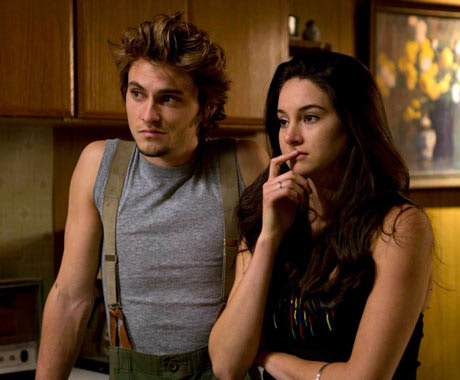From an apocalyptic, pansexual coming of age (Nowhere) and a stoner comedy about a cupcake-munching actress (Smiley Face) to a haunting saga of sexual abuse (Mysterious Skin), American indie stalwart Gregg Araki has never been one to give in to expectations. Still, love it or hate it, the polarizing director's films all bear his distinct auteurial stamp: stylized mise en scènes, unsettling, often supernatural realms, a punk-scored queer sensibility and hypercynical outsiders whose playful banter has UrbanDictionary.com staffers clocking in overtime. His films are all-dressed tonal pastiches that work best when grounded in some deeper truth about the human condition. Such is the case with his latest, the Sundance charmer White Bird in a Blizzard.
His second book adaptation (after Mysterious Skin), Araki's reimagining of Laura Kasischke's novel substitutes White Bird's original mid-'80s Ohio setting for late-'80s suburban SoCal, allowing the director to tap into the new wave hits that scored his own coming of age. Kat Connors (Shailene Woodley) is just your average, sexually starved 17-year-old who channels her inner Winona while dishing about boys with her two punchline-dispensing BFFs, played by Gabourey Sidibe and Mark Indelicato.
But this noirish melodrama ultimately revolves around Kat's thorny relationship with her tragic homemaker of a mom (Eva Green, jumping from reclusive to predatory to hysterical), who vanishes early on in the film, leaving angsty Kat and her withdrawn father (Christopher Meloni) to make sense of the disappearance, and Araki to move the story forward by way of flashbacks. Kat turns to her dumb-as-a-doorknob boy toy Phil (Shiloh Fernandez) for sexual relief, who claims he's too troubled by "the vicious circus" of life to get down and dirty. Recognizing he isn't "the brightest crayon in the box," Kat instead channels her carnal desires in the direction of a manly detective (Thomas Jane) assigned to her mom's case.
Were it not for Kat's sinister dreams, where she invariably comes face to face with her mother, buried alive in blocks of ice, she'd have long ago accepted the theory that the miserable Eve escaped a suffocating, wallpaper-kitsch nightmare of a life. But she begins to notice clues that don't align with her one-size-fits-all theory that the men in her life are tediously "all surface, with just more surface underneath."
Hitting theatres mere weeks after Gone Girl, this Douglas Sirk-infused, moody noir further chips away at the notion that when it comes to holy matrimony and suburban fairy tales, what you see is what you get. Told through Kat's voiceover narration and a stream of flashbacks, White Bird builds into a haunting tale of family repression, with measured moments of comic relief thrown in to avoid the trap of heavy-handed mystery. The many supporting turns unfortunately never rise above one-dimensional caricatures (the scripted sass of Sidibe and Indelicato is at times painful to watch, while Angela Bassett's thinly drawn part as Kat's therapist is a wasted opportunity), but strong central performances by Woodley and Green draw us into this panoramic suburban mystery. A poignant atmospheric score by Cocteau Twins' Robin Guthrie and avant-garde composer Harold Budd only adds to the prevailing mood of hot-blooded menace.
(Video Service Corp.)His second book adaptation (after Mysterious Skin), Araki's reimagining of Laura Kasischke's novel substitutes White Bird's original mid-'80s Ohio setting for late-'80s suburban SoCal, allowing the director to tap into the new wave hits that scored his own coming of age. Kat Connors (Shailene Woodley) is just your average, sexually starved 17-year-old who channels her inner Winona while dishing about boys with her two punchline-dispensing BFFs, played by Gabourey Sidibe and Mark Indelicato.
But this noirish melodrama ultimately revolves around Kat's thorny relationship with her tragic homemaker of a mom (Eva Green, jumping from reclusive to predatory to hysterical), who vanishes early on in the film, leaving angsty Kat and her withdrawn father (Christopher Meloni) to make sense of the disappearance, and Araki to move the story forward by way of flashbacks. Kat turns to her dumb-as-a-doorknob boy toy Phil (Shiloh Fernandez) for sexual relief, who claims he's too troubled by "the vicious circus" of life to get down and dirty. Recognizing he isn't "the brightest crayon in the box," Kat instead channels her carnal desires in the direction of a manly detective (Thomas Jane) assigned to her mom's case.
Were it not for Kat's sinister dreams, where she invariably comes face to face with her mother, buried alive in blocks of ice, she'd have long ago accepted the theory that the miserable Eve escaped a suffocating, wallpaper-kitsch nightmare of a life. But she begins to notice clues that don't align with her one-size-fits-all theory that the men in her life are tediously "all surface, with just more surface underneath."
Hitting theatres mere weeks after Gone Girl, this Douglas Sirk-infused, moody noir further chips away at the notion that when it comes to holy matrimony and suburban fairy tales, what you see is what you get. Told through Kat's voiceover narration and a stream of flashbacks, White Bird builds into a haunting tale of family repression, with measured moments of comic relief thrown in to avoid the trap of heavy-handed mystery. The many supporting turns unfortunately never rise above one-dimensional caricatures (the scripted sass of Sidibe and Indelicato is at times painful to watch, while Angela Bassett's thinly drawn part as Kat's therapist is a wasted opportunity), but strong central performances by Woodley and Green draw us into this panoramic suburban mystery. A poignant atmospheric score by Cocteau Twins' Robin Guthrie and avant-garde composer Harold Budd only adds to the prevailing mood of hot-blooded menace.
